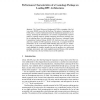Free Online Productivity Tools
i2Speak
i2Symbol
i2OCR
iTex2Img
iWeb2Print
iWeb2Shot
i2Type
iPdf2Split
iPdf2Merge
i2Bopomofo
i2Arabic
i2Style
i2Image
i2PDF
iLatex2Rtf
Sci2ools
HIPC
2004
Springer
2004
Springer
Performance Characteristics of a Cosmology Package on Leading HPC Architectures
Abstract. The Cosmic Microwave Background (CMB) is a snapshot of the Universe some 400,000 years after the Big Bang. The pattern of anisotropies in the CMB carries a wealth of information about the fundamental parameters of cosmology. Extracting this information is an extremely computationally expensive endeavor, requiring massively parallel computers and software packages capable of exploiting them. One such package is the Microwave Anisotropy Dataset Computational Analysis Package (MADCAP) which has been used to analyze data from a number of CMB experiments. In this work, we compare MADCAP performance on the vector-based Earth Simulator (ES) and Cray X1 architectures and two leading superscalar systems, the IBM Power3 and Power4. Our results highlight the complex interplay between the problem size, architectural paradigm, interconnect, and vendor-supplied numerical libraries, while isolating the I/O filesystem as the key bottleneck across all the platforms.
| Added | 01 Jul 2010 |
| Updated | 01 Jul 2010 |
| Type | Conference |
| Year | 2004 |
| Where | HIPC |
| Authors | Jonathan Carter, Julian Borrill, Leonid Oliker |
Comments (0)

